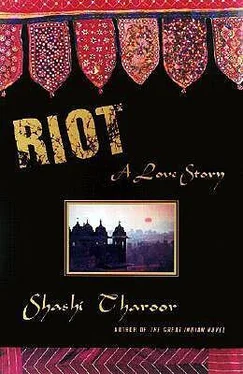— I am. When we got involved I began to think nothing else mattered. Not my wife, not my job, not my child, not your past. But I’ve discovered it all does. That I can’t just walk away from it all.
— But you can just walk away from me.
— No, I can’t! Don’t you see how terrible my torment is?
— But don’t you see that I can’t wait forever for you to end your confusion?
— I know you can’t.
— You’ve come to mean more to me than anyone I’ve ever known. I thought we had a future together.
— Please don’t cry. Here, take my handkerchief.
— I don’t understand, Lucky. You tell me I’m the woman you’ve always dreamed of, I fulfil every desire you have as a man, and when I tell you I feel the same way and I want us to be forever, you withdraw?
— I’m not withdrawing, Priscilla. I love you. I just can’t break up my family, destroy my daughter—
— I’d never ask you to destroy your daughter. Can’t you take her away from that dreadful wife of yours?
— I doubt a court would give her to me. And with my life, my work, how could I take care of her?
— I’d help.
— But you’re not her mother, Priscilla. With all her faults, Geetha is.
— Please remove your arm, Lucky. I’m leaving.
— I don’t want you to go.
— No, you want me to stay, so that you can fuck me and then you can go, to your wife. Thanks, but I’ve had enough of that scenario.
— Priscilla, don’t get up, please.
[Silence.]
— Priscilla, I love you.
[Silence. A long silence, followed by the creaking of a door, a sibilant sniffling retreating down the stairs, the rattle of a bicycle chain, and the squeaking crunch of thin tires on the twig-strewn ground, fading into the distance.]
from Lakshman’s journal
August 22, 1989
Words, old Oscar would have said, mere words — but how terrible, how vivid, how cruel. And is there anything so real as the words we use to define our lives?
I remember an old sadhu my parents took me to once, a wizened bare figure whose skin hung impossibly in folds, the hair on his head sparse and unruly, his white beard his only adornment. We sat at his feet for what seemed to me the longest time, but when I began to speak he raised an aged finger to his white-shrouded lips. “Whatever you have to say, my son,” he said, “say it in silence.”
It is a prescription I forget too often: Whatever you have to say, say it in silence.
With Priscilla now, silence is all I have.
letter from Lakshman to Priscilla
August 25, 1989
My darling Priscilla,
Please try and understand what I’m going through. The last three days since I saw you have been the worst three days of my life. I was shattered when you left like that, and I haven’t slept a wink. I feel physically ill. I told you that losing you would be like amputating a limb — they say you constantly feel pain from the place where the limb used to be. In my case, that’s my heart.
I feel I’ve conducted a terrible mutilation of myself in telling you why I couldn’t give you the commitment you seek. Watching you cycle away into the darkness last Tuesday was the most wrenching experience of my life.
And yet I have made my own bed and I must lie in it. I’m a desperately sad human being who is suffering terribly, and my suffering is made no more bearable by the fact that it is self-inflicted. I could have said something else to you, but I knew you deserved the truth. I felt I could not do otherwise, my dearest Priscilla, and be true to myself, above all to my obligations as a man and my duty as a father. It was the most difficult choice I’ve ever had to make, and at one level I still can’t believe I’ve made it.
I can’t bear to think I won’t see you again at the Kotli. I’ll be there anyway tomorrow, as usual. I’ll understand if you don’t want to come anymore. I’m in too much pain to be anywhere else on Saturday, so I’ll go there, even if it is to be alone with my memories.
May the divine Providence in which both of us believes give you strength and happiness, and may some of it rub off on me.
Always your (un) Lucky
from Lakshman’s journal
August 26, 1989
She comes to him that Saturday, of course. She leaves her cycle in the shrubbery and walks softly up the old stone stairway to their lair. He is sitting on the ledge, his hair swept back by the wind, looking pensively at the river as darkness slowly reaches out to embrace the horizon. She sees him and her heartbeat catches in her veins like a scarf on a doorknob, so that she stumbles on the threshold and has to steady herself. He turns then, mist in his eyes, and when he sees her the gloom lifts off his shoulders like a veil. He rises and bounds to her, and she is caught up in his arms like a butterfly in a strong gust, fluttering but imprisoned, and he is kissing her so hard that the breath is pushed out of her. She surrenders, feeling his hands running up and down her body as if to reassure himself she is all there. He finds that she is, and his heart is delighted, his eyes sparkling in wordless pleasure as she in turn strokes his face, still silent, and he catches her fingers and kisses them, and before she knows it he is on top of her and inside her and it is as if he is strumming the same tune she has always heard and it has never stopped playing. And afterwards neither of them wants to speak because each is afraid of what the other might say.
And they are right not to speak, for how can either of them explain what has happened? It is a blur in his mind, and yet an indelible blur. He peels off her clothing, the soft cotton skirt with the swirling print, the comfortably loose blouse, as light and flammable as the spirit it sheathes. The hooks of her bra do not resist him this time, her panties slide off like a wisp, and she is naked in his urgent arms, unquestioning in her surrender. He is still kissing her as he turns her around, and she shows no surprise at finding herself on her knees on the mat. He is behind her now, tugging at his belt, and he sees them both in the mirror, that long mirror in which they have so often seen the sunset, except that what it reveals now in the shadows is the paleness of her beneath him on her hands and knees, her face averted, her breasts swaying with each thrust as he takes her from behind. He is transported by his conquest as he watches her in the mirror and beneath him, the curve of her back vividly stretched in her submission, his hands on the soft flesh below her hips as he drives home his message of need and possession. He remembers that this is not supposed to happen, that this is the one thing she will not do, but he has not asked and she has not resisted. He keeps his eyes open throughout, blinking only briefly in climax, and in his wonderment he does not see, or he imagines he cannot see, the solitary tear that drops gently down her love-saddened face.
Geetha Lakshman at the Shiva Mandir
September 2, 1989
Every Saturday I have come here with my daughter to pray, Swamiji, and I have sought your blessings and your advice. Remember how you told me that a devout woman like me should not hesitate to come to you with any kind of problem? Tonight I really need your help, Swamiji.
Yesterday my husband’s friend Gurinder told me he had to speak to me. He said he had thought about it for a long time and hesitated but now he felt he had no choice. He made me swear not to breathe a word to my husband about what he was going to tell me. And then he said — aiyo, such a terrible thing. He said my husband was in love with another woman and wanted to leave me. It was the yellow-haired American woman, of course. And he was thinking of leaving my daughter and me and running off with her to America.
Читать дальше












